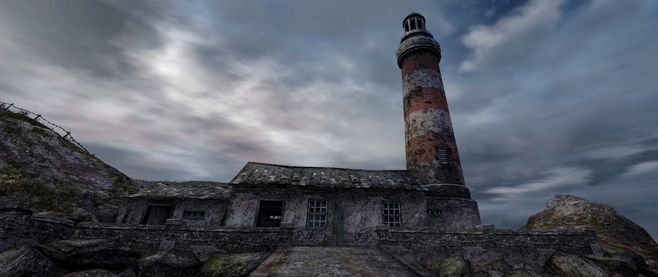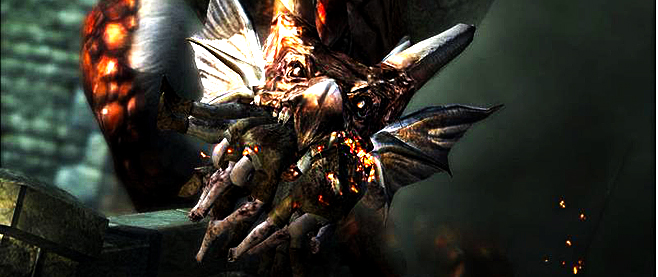
Esther’s Bones
I shone a torch into the wordless chasm of the lighthouse. A figure on the upper staircase smarted, shrank from my glare. I knew a sudden fear and needed reassurance. I backed away.
“Play the game and tell me if your lighthouse has a ghost too,” I said to my boyfriend.
Playing Dear Esther in our respective homes on opposite sides of the city, listing the things we’d each seen to each other over Steam, phoning each other when either of us experienced some huge revelation – we had found a strange togetherness. I listened intently to his observations of caves and candles. I pulled apart the knots in the thousand tiny stories I saw played out around that island; together, we filled the cracks in a much larger story that wove itself into existence through our words. Everything had faded into this brief clarity, growing sharp and beautiful.
We finally stood straight, and looked one another in the eye. Together we sighted dark wisps, the ghosts of things to come, and we wondered aloud what they meant.
We projected our lights and our darknesses onto the island, onto its roiling skies and disintegrating buildings, onto Esther’s bruised, gleaming bones.
———
It was a moment I’d tried to immortalize in my first few drafts of this article, rubbishing one rendition after another as I fumbled for a fitting way to phrase what I’d felt in that whisper of a moment at the lighthouse. Fixated on that burst of understanding, I became oblivious to the disturbed mist that encircled me, curled around the island of my body.
When we both first began to play Dear Esther, I expected a certain linearity. I expected the same game, played twice. I expected something momentarily lovely, something fairly decent with emotions quickly forgotten. I was content to resign myself to my slow trudge along her shores. I was content to simply experience and not feel.
I had not expected to see the fraying threads of a relationship begin to stitch themselves together again, no matter how tenuously. Buried in the narrator’s strident letters to Esther were my own letters to my boyfriend of the time, even letters to myself. I pored over this dialogue with wide eyes, feeling thick curtains fall away around me as something grew in the darkness.

At first, I was on my own. This was nothing new to me. Somehow, in three years of a relationship, I’d still always felt as though I was on my own. I climbed the grasses of mountains and pressed myself into cliff faces, eying the candy-colored mist that daubed out the horizon as I wept for the frozen shepherd who had perished here on this island, loveless.
On my numerous, repeated paths along Esther‘s coasts, through her skeletons of shipwrecks and into the burdensome depths of her caves and her nightmares, I began to notice strange things.
Where once was a Bible, laid down like an offering before a momentous stone, was now a dog-eared chemistry book; I became Godless, and in not knowing how to read the diagrams of nerve endings that followed me through caverns, I was lost.
Birds came and went in each playthrough, scratches in the sky. Later, sometimes, I would find three seagulls, wrung of life and rotting into the sand. Other times I’d find three unhatched eggs, shielded by golden candles. Death flitted, a mirage in my head.
The game, flush with intense, subtly shifting details, made me question not its mechanics or its characters, but myself. I waded into the ocean and felt myself pressed down by its force, seeing not the murk of seawater around me, but the sky. A distorted tower, the shrill headlights of a car, close-ups of ultrasounds – I fell deeper into Esther. I tried to understand why these images, seemingly random and incredibly isolating, echoed within me.
So absorbed I was in my journey that, when my boyfriend reached out to me, fumbling for his own interpretation, I had dismissed him.
“The stream in the cave is flowing backwards now,” he had said to me quietly.
I emerged from my sea, opened my eyes, blinked. “What?” Clearly he was delusional.
“The little river, in the underwater chasm,” he continued. “It’s flowing in the opposite direction to when I last saw it. You know, where you usually see a paper boat float by?”
I shrugged off this bizarre observation with a suggestion that he was probably crazy. I believed him to be confused, looking for signs where there were none. Truth was, I had never seen this paper boat pass me, either.

When I first began to write this, I tried to focus on this perceived lunacy, this concept of Dear Esther messing with the minds of two people as they played simultaneously, but apart; the ways in which the game’s shifting stories at first split to create a plunging valley between two players, forcing them to scale cliffs and harsh winds to finally come together again.
And in a way, that’s exactly what happened with him and me. Slowly, as we shared details of the things we had seen and the things we hadn’t, the things that made us question ourselves and each other, we came to a strange, mounting understanding. Our islands collided; we became ghosts in each other’s games, fluttering along mountain paths and standing vigil by candlelight, helping to color and shape each other’s stories.
But I know now why I harbored such disbelief in his views before we reached that final, brief synchronicity. The discrepancies between the things we saw in Dear Esther, the differences in our playthroughs that I deemed him “crazy” for – these merely echoed our relationship. I had grown tired and impatient after more than three years of a relationship that simply did not advance, a relationship that trapped me in its stagnation and my own inaction. I distanced him deliberately; I believed this island of Esther‘s limbs my own journey to undertake.
But, once he had reached to me through my fog, I relented. I let him into my game. I grew to actually understand the things he saw and perceived, and sometimes I would even phone him, near-joyously, if an observation of his replicated itself in my own story.
Dear Esther was a sudden heartbeat in a flatlining relationship, a realization that we were not alone on our islands and perhaps existed alongside one another in more than just an indifferent acceptance. It was the first true sense of togetherness I’d felt with him in years.

I struggled, knowing that things between us would have to end.
And I struggled with this story for too long, trying to recapture a brief spark that quickly faded and that I knew was probably never going to return. I wrote the lighthouse scene, over and over again, as I tried to brighten its beam, to force out its ghostly presence.
My boyfriend and I finally broke up, a few weeks after we stopped playing Dear Esther. I embraced the ghosts; they lit candles for us, and became happier stories that faded only when we no longer respected the distance between us. Demented with new emotion, we limped to our end. We roared down to the ocean, joyously, finally. My shadow, a bird, parted from me, veering as I glided over paper boats and faded to nothing.
I’m done with Esther. For too long I was her narrator, releasing my regrets into her waters, pushing them into her fractures. Now her bones rise like a city before me, her battered ribs swollen with promise. This story finally rose from the grave of her seawater, and my lighthouse is finally towers against the night, guiding my way forward through her haze.





